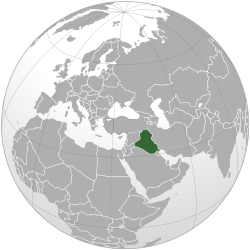History of Iraq under Qasim and the rise of Arab nationalism
| Iraqi Republic | ||||||||||
|
الجمهورية العراقية al-Jumhūrīyah al-‘Irāqīyah كۆماری عێراق Komar-i ‘Êraq |
||||||||||
|
||||||||||
|
Anthem Walla Zaman Ya Selahy والله زمان يا سلاحي Oh My Weapon |
||||||||||
| Capital | Baghdad | |||||||||
| Languages |
Arabic Kurdish |
|||||||||
| Government | One-party state under military junta | |||||||||
| President | ||||||||||
| • | 1958-1963 | Muhammad Najib | ||||||||
| • | 1963-1966 | Abdul Salam Arif | ||||||||
| • | 1966-1968 | Abdul Rahman Arif | ||||||||
| Prime Minister | ||||||||||
| • | 1958-1963 (first) | Abd al-Karim Qasim | ||||||||
| • | 1967-1968 (last) | Tahir Yahya | ||||||||
| Legislature | Revolutionary Command Council | |||||||||
| Historical era | Cold War | |||||||||
| • | 14 July Revolution | 14 July 1958 | ||||||||
| • | Ramadan Revolution | 8 February 1963 | ||||||||
| • | Counter-coup | 10–11 November 1963 | ||||||||
| • | 17 July Revolution | 17 July 1968 | ||||||||
| Area | ||||||||||
| • | 1968 | 438,317 km2 (169,235 sq mi) | ||||||||
| Population | ||||||||||
| • | 1968 est. | 9,367,100 | ||||||||
| Density | 21/km2 (55/sq mi) | |||||||||
| Currency | Iraqi dinar (IQD) | |||||||||
|
||||||||||
The Iraqi Republic (Arabic: الجمهورية العراقية al-Jumhūrīyah al-‘Irāqīyah) was a state forged in 1958 under the rule of President Muhammad Najib ar-Ruba'i and Prime Minister Abd al-Karim Qasim. ar-Ruba'i and Qasim first came to power through the 14 July Revolution in which the Kingdom of Iraq's Hashemite monarchy was overthrown. As a result, the Kingdom and the Arab Federation were dissolved and the Iraqi republic established. The era ended with the Ba'athist rise to power in 1968.
Iraq reverted to control over the territory of the former Kingdom of Iraq and Jordan again became an independent entity.
Qasim specifically sited the north-south territorial limits from its highest point in the North and lowest point in the South identified in the regime's popular slogan as being "From Zakho in the North to Kuwait in the South", Zakho referring to the border then-and-now between Iraq and Turkey. The Qasim government in Iraq and its supporters supported Kurdish irredentism towards what they called "Kurdistan that is annexed to Iran", implying that Iraq supported unification of Iranian Kurdistan into Iraqi Kurdistan. The Qasim government did not hold territorial claims to Kurdish territories in Turkey, as the Qasim government roughly defined what it considered Iraq's borders in the regime's popular slogan: "From Zakho in the North to Kuwait in the South", Zakho referring to the border then-and-now between Iraq and Turkey. The Qasim government held an irredentist claim to Khuzestan. It held irredentist claims to Kuwait.
Abd al-Karim Qasim promoted a civic Iraqi nationalism that recognized Iraq's Arabs and Kurds as equal partners in the state of Iraq, Kurdish language was not only formally legally permitted in Iraq under the Qassim government, but the Kurdish version of the Arabic alphabet was adopted for use by the Iraqi state and the Kurdish language became the medium of instruction in all educational institutions, both in the Kurdish territories and in the rest of Iraq. Under Qassim, Iraqi cultural identity based on Arabo-Kurdish fraternity was stressed over ethnic identity, Qassim's government sought to merge Kurdish nationalism into Iraqi nationalism and Iraqi culture, stating: "Iraq is not only an Arab state, but an Arabo-Kurdish state...[T]he recognition of Kurdish nationalism by Arabs proves clearly that we are associated in the country, that we are Irakians first, Arabs and Kurds later". The Qassim government and its supporters supported Kurdish irredentism towards what they called "Kurdistan that is annexed to Iran", implying that Iraq held irredentist claims on Iran's Kurdish populated territories that it supported being united with Iraq. The Qassim government's pro-Kurdish policies including a statement promising "Kurdish national rights within Iraqi unity" and open attempts by Iraq to coopt Iranian Kurds to support unifying with Iraq resulted in Iran responding by declaring Iran's support for the unification of all Kurds who were residing in Iraq and Syria, into Iran. Qassim's initial policies towards Kurds were very popular amongst Kurds across the Middle East whom in support of his policies called Qassim "the leader of the Arabs and the Kurds".
...
Wikipedia




